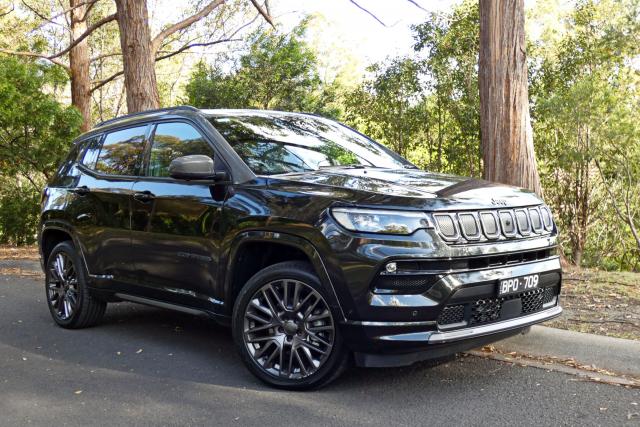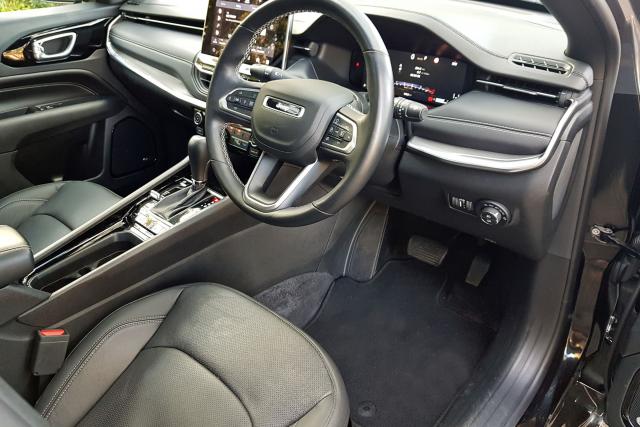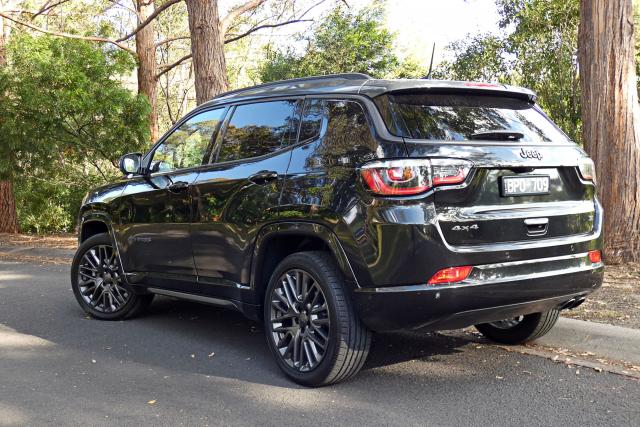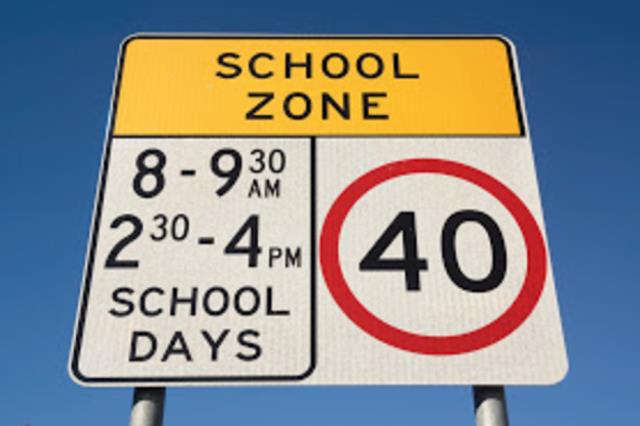Compass is the smallest and cheapest of Jeep’s off-roaders and looks very much like a smaller version of Grand Cherokee.
Introduced in 2007, Compass and its rebadged sibling Patriot were the first of Jeep’s softer offerings, pitched at an entirely new customer.
Compass was rounder, cuddlier and generally more city-focused, while the Patriot which was dropped in 2016 was squarer, chunkier and more macho.
The current model, launched in 2020, has changed significantly, with enhanced tech, redesigned dashboard, a refined cabin and an extensive list of driver-assist systems.
Jeep describes the car as built for pragmatic dreamers who spend their weekdays in comfort and style, and weekends escaping from the daily routine.
STYLING
Compass comes in four grades, three with the same 2.4-litre four-cylinder petrol engine, while top of the range Trailhawk is the only Jeep in the current line-up to retain a diesel.
The range kicks off with the front-drive Night Eagle from $39,950, the Limited from $46,700, S-Limited from $49,700 and Trailhawk from $54,000 — all before on-road costs.
Premium paint adds $645 to the price, with a top up option pack available for each grade.
Our test vehicle the S-Limited was fitted with the $2950 S-Limited Premium Package, which adds a dual-pane sunroof, heated and ventilated front seats, a heated steering wheel and 360-degree surround view camera — bringing the total price to $52,650 before on-roads.
Finished in black with a grey roof and riding on 19-inch alloys, S-Limited is targeted at those who want comfort and refinement, but are not prepared to compromise on off-road capability.
Standard features include leather with contrast accent stitching, two-zone climate air, push-button start and power-adjust heated and cooled front seats.
There’s also LED head and tail lights, auto high beam, parallel and perpendicular parking assistance, front and rear parking sensors, auto lights and wipers, auto dimming rear-view mirror and an electric parking brake.
A kick-operated power tailgate is standard on all but the entry level grade.
Compass comes with a 5-year/100,000km warranty and lifetime roadside assistance for vehicles serviced by Jeep.
Capped-price servicing means you’ll pay $349 per visit for the first five services, with intervals set at 12 months or 12,000km.
INFOTAINMENT
Infotainment is provided by the latest Uconnect 5 system, with a 10.1-inch touchscreen and in the case of this model nine-speaker 506-watt Alpine audio.
It features voice control, built-in TomTom navigation, Bluetooth, DAB+ digital radio, fully customisable homepage and new ‘touch and swipe’ mode with the option to create widgets.
You can create multiple user profiles that store music preferences, apps, seat position, mirror angles and aircon levels, plus frequent destinations and ‘Valet’ mode.
What you can’t do is play with the system on the move. No, no, no!
Try changing from DAB to AM/FM and back again. It can’t be done, not unless you have a pre-set station for the destination band.
There’s also wireless charging and wireless integration via Apple CarPlay and Android Auto, with first row USB Type A/C and second row USB Type A/C, 230V and 12V outlets.
ENGINES / TRANSMISSIONS
With a 2.4-litre four-cylinder petrol engine, Compass produces 129kW of power at 6400 revs and 229Nm of torque from 3900 revs.
It’s multipoint rather than direct injection with drive is to all four wheels through a 9-speed automatic transmission and torque on demand.
That means it operates in front wheel drive most of the time, with the rear wheels engaging when traction is required.
SAFETY
Compass gets a full five stars for crash safety, with front, side and curtain airbags, a rear-view camera and automatic emergency braking with pedestrian and cyclist recognition.
There’s also forward collision warning, blind spot monitoring, rear cross path detection and lane departure warning plus.
Add to this traffic sign recognition, intelligent speed assist and drowsy driver alert.
DRIVING
Weighing in at 1503kg, fuel consumption is a claimed 9.7L/100km and it produces 230gm of CO2 per kilometre.
In the US the latest model comes with a more sophisticated 2.0-litre direct injection engine that produces 149kW and 300Nm.
A hybrid version, called 4xe, is also offered overseas, but is not available from the Indian factory where our cars are built.
Although Compass looks terrific and draws plenty of admiring glances, its performance doesn’t quite live up to those looks.
The dash from 0-100km/h takes a leisurely 10.1 seconds and factor in some passengers, and it will take considerably longer.
Compass can seat four adults in reasonable comfort, but keep in mind it sits on the smaller side of the spectrum, so rear legroom is limited and it has a smallish boot.
Inside the decor is a big step up from previous offerings, with better fit and trim, and plenty of eye candy.
The driver gets a wheel that can be adjusted for height and reach, power-adjustment for the driver’s seat and a token footrest — the size and placement of which are not ideal.
There’s also a new, high definition, 10.25-inch digital instrument cluster that can be configured to show different information, including a digital speedo.
An interesting option is to display a smaller speedo, with a larger speed limit in the centre of screen that flashes in warning when you are going too fast.
The boot which hides a space saver spare was just large enough to accommodate the gear for four adults on a weekend away.
But a word of warning. If you need to remove the parcel shelf, make sure you do so before putting anything in the back — even then it’s a challenge.
And, by the way, the foot-operated boot opener refused to cooperate.
Throttle response off the line is good and the engine likes to rev. But at other times it takes a full two seconds to respond and the transmission tends to hunt on anything but flat terrain.
Ride and handling are pretty good, with the car refusing to break traction even when pushed hard through corners.
But the lane keeping assistance system is downright annoying and like me, you’ll probably end up switching it off.
Turning circle is relatively large at 11.07 metres which means you’ll find yourself doing plenty of three-point turns.
When it comes to going off road, this model boasts the same Jeep Active Drive Low 4×4 system as the Trailhawk.
The big difference is that it doesn’t have off-road suspension, or any underbody protection.
At 212mm it has 13mm less ground clearance than Trailhawk too.
Although there’s a 4WD LOW option, neither model have a two-speed transfer case and therefore no low range gearing. All this button does is keep the transmission in first gear, which is possible with most automatics.
Another button is labelled as 4WD LOCK. What this does is transmit torque equally to both the front and rear wheels.
None of the above suggests the S-Limited is up to more than ‘roughish’ dirt roads.
In terms of fuel consumption, it has a 60-litre tank and takes standard unleaded.
We were getting 9.4L/100km after more than 400km — less than the 9.7L claimed — but still too much for what it is.
SUMMING UP
While the Jeep Compass is a head turner, its performance unfortunately doesn’t match these looks, nor does it have any real off-road capability.
Given the unavailability of the hybrid, we’d be waiting at the very least for the new 2.0-litre direct injection engine to make an appearance in Australia.
RATINGS:
Looks: 8
Performance: 6
Safety: 8
Thirst: 6
Practicality: 7
Comfort: 7.5
Tech: 7.5
Value: 7.5
Overall: 7.2
MODEL RANGE:
2.4 Night Eagle petrol: $39,950
2.4 Limited petrol: $46,700
2.4 S-Limited petrol: $49,700
2.0 Trailhawk diesel: $54,000
Note: These prices do not include government or dealer delivery charges. Contact your local Jeep dealer for drive-away prices.



















